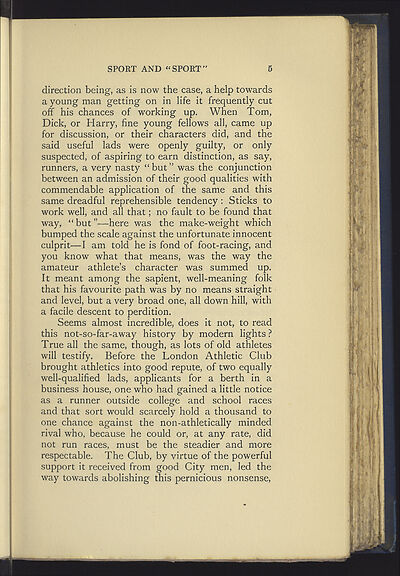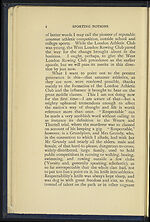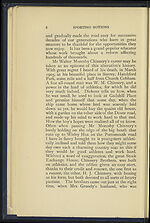Download files
Complete book:
Individual page:
Thumbnail gallery: Grid view | List view

SPORT AND
CI
SPORT" 5
direction being, as is now the case, a help towards
a young man getting on in life it frequently cut
off his chances of working up. When Tom,
Dick, or Harry, fine young fellows all, came up
for discussion, or their characters did, and the
said useful lads were openly guilty, or only
suspected, of aspiring to earn distinction, as say,
runners, a very nasty " but " was the conjunction
between an admission of their good qualities with
commendable application of the same and this
same dreadful reprehensible tendency: Sticks to
work well, and all that ; no fault to be found that
way, "but "—here was the make-weight which
bumped the scale against the unfortunate innocent
culprit—I am told he is fond of foot-racing, and
you know what that means, was the way the
amateur athlete's character was summed up.
It meant among the sapient, well-meaning folk
that his favourite path was by no means straight
and level, but a very broad one, all down hill, with
a facile descent to perdition.
Seems almost incredible, does it not, to read
this not-so-far-away history by modern lights ?
True all the same, though, as lots of old athletes
will testify. Before the London Athletic Club
brought athletics into good repute, of two equally
well-qualified lads, applicants for a berth in a
business house, one who had gained a little notice
as a runner outside college and school races
and that sort would scarcely hold a thousand to
one chance against the non-athletically minded
rival who, because he could or, at any rate, did
not run races, must be the steadier and more
respectable. The Club, by virtue of the powerful
support it received from good City men, led the
way towards abolishing this pernicious nonsense,
CI
SPORT" 5
direction being, as is now the case, a help towards
a young man getting on in life it frequently cut
off his chances of working up. When Tom,
Dick, or Harry, fine young fellows all, came up
for discussion, or their characters did, and the
said useful lads were openly guilty, or only
suspected, of aspiring to earn distinction, as say,
runners, a very nasty " but " was the conjunction
between an admission of their good qualities with
commendable application of the same and this
same dreadful reprehensible tendency: Sticks to
work well, and all that ; no fault to be found that
way, "but "—here was the make-weight which
bumped the scale against the unfortunate innocent
culprit—I am told he is fond of foot-racing, and
you know what that means, was the way the
amateur athlete's character was summed up.
It meant among the sapient, well-meaning folk
that his favourite path was by no means straight
and level, but a very broad one, all down hill, with
a facile descent to perdition.
Seems almost incredible, does it not, to read
this not-so-far-away history by modern lights ?
True all the same, though, as lots of old athletes
will testify. Before the London Athletic Club
brought athletics into good repute, of two equally
well-qualified lads, applicants for a berth in a
business house, one who had gained a little notice
as a runner outside college and school races
and that sort would scarcely hold a thousand to
one chance against the non-athletically minded
rival who, because he could or, at any rate, did
not run races, must be the steadier and more
respectable. The Club, by virtue of the powerful
support it received from good City men, led the
way towards abolishing this pernicious nonsense,
Set display mode to:
![]() Universal Viewer |
Universal Viewer | ![]() Mirador |
Large image | Transcription
Mirador |
Large image | Transcription
Images and transcriptions on this page, including medium image downloads, may be used under the Creative Commons Attribution 4.0 International Licence unless otherwise stated. ![]()
| Sports publications > Sporting notions of present days and past > (17) |
|---|
| Permanent URL | https://digital.nls.uk/231782923 |
|---|
| Description | More than 230 sports publications from the National Library of Scotland's collections. Featured sports include football, rugby, golf, shinty, athletics, bowls, cricket and hockey. Among the material from the late 19th and early 20th centuries are match programmes, club histories, and handbooks. From the late 20th century are promotional materials to encourage greater diversity in sport. Most items cover sports activities in Scotland. There are also publications relating to the Olympics and international matches. |
|---|---|
| Additional NLS resources: |
|

